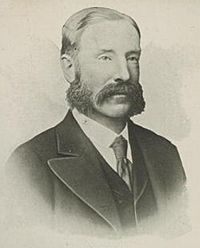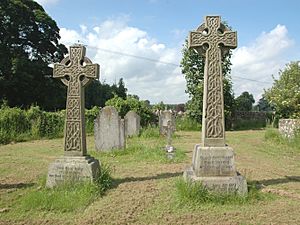Victor Child Villiers, 7th Earl of Jersey facts for kids
Quick facts for kids
The Earl of Jersey
|
|
|---|---|

The Earl of Jersey by H. Newman, courtesy of the National Library of Australia.
|
|
| 17th Governor of New South Wales | |
| In office January 1891 – March 1893 |
|
| Monarch | Victoria |
| Preceded by | The Lord Carrington |
| Succeeded by | Robert Duff |
| Paymaster General | |
| In office 1889 – December 1890 |
|
| Prime Minister | The Marquess of Salisbury |
| Preceded by | The Earl Brownlow |
| Succeeded by | The Lord Windsor |
| Personal details | |
| Born | 20 March 1845 Berkeley Square, London |
| Died | 31 May 1915 (aged 70) Osterley Park, Middlesex |
| Nationality | British |
| Political party | Conservative |
| Spouse | Margaret Leigh (m. 1872-1915; his death) |
| Children | 6 |
| Parents | George Child Villiers, 6th Earl of Jersey Julia Peel |
| Alma mater | Balliol College, Oxford |
Victor Albert George Child Villiers, 7th Earl of Jersey (born March 20, 1845 – died May 31, 1915) was an important British figure. He was a banker, a Conservative politician, and a colonial administrator. He is best known for serving as the Governor of New South Wales in Australia from 1891 to 1893. He also held other significant roles in the British government.
Contents
Early Life and Education
Victor Albert George Child Villiers was born in Berkeley Square, London. He was the oldest son of George Child Villiers, the 6th Earl of Jersey. His mother, Julia Peel, was the daughter of a former Prime Minister, Sir Robert Peel.
He went to school at Eton and then studied at Balliol College, Oxford. When he was just 14 years old, in October 1859, he became the Earl of Jersey. This happened after his father passed away. He also became the main owner of his family's banking business, Child & Co..
Political Roles and Public Service
Lord Jersey started his political career as a Lord-in-waiting from 1875 to 1877. This role meant he helped the government in the House of Lords. He later became Paymaster General in 1889, a job where he managed government payments. He held this position until 1890. In the same year, he became a member of the Privy Council, a group of important advisors to the Queen. He also received a special honor called Knight Grand Cross of the Order of St Michael and St George (GCMG).
Governor of New South Wales
In August 1890, Lord Jersey was chosen to be the Governor of New South Wales in Australia. He arrived there in January 1891. During his time as Governor, there were no big political problems. People described him as kind and well-meaning. However, he was also said to be very focused on his own family. He was the official host for an important meeting in Sydney in 1891, called the Australasian National Convention.
Lord Jersey resigned from his role in November 1892, saying he had important business to attend to. This decision was not popular with the government in London. He felt that the job of a governor was not as serious as he had imagined, mainly involving social events. He left Australia in March 1893.
Later Public Service
After returning from Australia, Lord Jersey continued to serve the country. He represented the United Kingdom at the 1894 Colonial Conference in Canada. He also worked as the Agent-General for New South Wales in London from 1903 to 1905. In this role, he used his banking connections to help New South Wales with its loan agreements. He visited Australia again in 1905.
Interestingly, one of Lord Jersey's godparents was Queen Victoria. The Queen agreed to be his godparent as a sign of friendship with his grandfather, Prime Minister Robert Peel.
Other Important Appointments
Lord Jersey held several other public positions. In 1875, he was made an Honorary Colonel of the 1st Glamorganshire Artillery Volunteers. He was also the Lord Lieutenant of Oxfordshire from 1877, which meant he was the monarch's personal representative in that county. From 1885, he was a Deputy Lieutenant for Warwickshire and a Justice of the Peace (a local judge) for both Warwickshire and Oxfordshire.
From 1896 to 1905, he was the Chairman of the Light Railway Commission. In 1900, he received another high honor, becoming a Knight Grand Cross of the Order of the Bath.
Freemasonry Involvement
Lord Jersey was also a Freemason, joining the group in 1865 when he was 20 years old. He quickly rose through the ranks. In 1870, he became the Senior Grand Warden of the United Grand Lodge of England. In 1885, he was appointed Provincial Grand Master of Oxfordshire. When he became Governor of New South Wales, he also became the Grand Master of the Grand Lodge of New South Wales in 1891.
Family Life
Lord Jersey married the Hon. Margaret Elizabeth Leigh on September 19, 1872. She was the daughter of William Henry Leigh, 2nd Baron Leigh. They had six children together:
- George Henry Robert Child Villiers, 8th Earl of Jersey (1873–1923)
- Lady Margaret Child Villiers (1874–1874), who sadly died as a baby.
- Lady Margaret Child Villiers (1875–1959), who later married Walter Rice, 7th Baron Dynevor.
- Lady Mary Julia Child Villiers (1877–1933), who married Thomas Pakenham, 5th Earl of Longford.
- Lady Beatrice Child Villiers (1880–1970), who married Edward Plunkett, 18th Baron of Dunsany.
- Hon. Arthur George Child Villiers (1883–1969)
Lord Jersey had a stroke in 1909. He passed away at Osterley Park, Middlesex, in May 1915, at the age of 70. His oldest son, George, became the next Earl. His wife, Margaret, lived for another 30 years and died in May 1945, at the age of 95.
 | Mary Eliza Mahoney |
 | Susie King Taylor |
 | Ida Gray |
 | Eliza Ann Grier |


